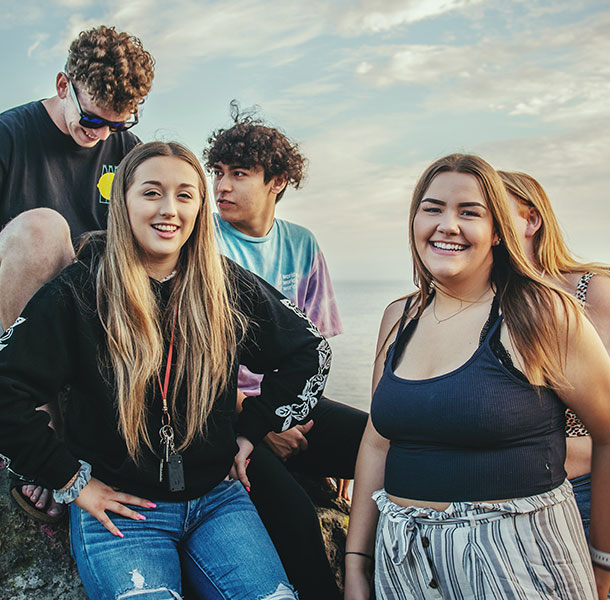Take a look at our leaving care offer below and find out about what entitlements and support are available to you. If you would like to speak to someone about your offer, then contact your personal advisor or get in touch!
Take a look at our leaving care offer below and find out about what entitlements and support are available to you. If you would like to speak to someone about your offer, then contact your personal advisor or get in touch!


We know it is important for you to see and maintain relationships with people who are important to you. We also know by supporting you to build friendships in your community; at work or through your studies, can lead to lifetime friendships and support for you. This section is all about how we will support you to maintain relationships and guide you with advice and opportunities to build long term support networks. Because we know relationships can be difficult sometimes, your PA will be able to offer you advice and strategies that may help. If you need more support, we also have access to some therapeutic services.



Independent Visitors are adult volunteers from your local community who enjoy spending time with young people. They are there to support, listen and advise you, but most importantly to have fun – they are there just for you! They work with young people who are looked after by the Local Authority between the ages of 8 and 17 years old. If they are working with you prior to turning 18, we can usually arrange for this support to continue post 18.
Independent Visitors Service match someone with you who they think you will get on well with. They will visit you once a month, building a friendship and doing things with you which you enjoy. This might include:
Most visits take place at weekends or in school holidays when you are free.
If you are a looked after child, aged between 8-17 years old and would like to have an Independent Visitor, talk to your social worker, carer or Conference Reviewing Officer (CRO) and ask them to make a referral. Alternatively, you can contact them by email.
Before turning 18, your Social Worker will be visiting you every 6 weeks and you will have their contact details. If you are living in settled circumstances, they may visit you every 3 months. Your PA will meet you when you turn 17. Your PA will visit you every 8 weeks and more if needed. When you turn 18, your Social Worker will stop visiting you. Your PA will continue to visit you at least every 8 weeks up until you are 21. This is what the law states is the minimum a PA should see you. Your PA will meet with you as often as you need and stay in contact between visits. This may be by text, mobile, email, Skype and/or WhatsApp. You and your PA will agree how you want to keep in contact with each other.
When you turn 21, if you are not in education, your PA will talk to you about whether you wish for their support to continue. If you do, this is fine, they will continue to support you. If you choose to stop seeing them, you can come back to us at any point up to the age of 25 and request a PA again. If you are in education, the law states we must continue to provide a PA to you until you complete your education. If you are 21 and still in education, you can agree how often you will see your PA, but we would like this to be a minimum every 3 months so we can check everything is going okay for you. Your Pathway Plan will continue to be reviewed every 6 months whilst you remain in contact with your PA.
When you first meet your PA, they will provide you with their contact details so you know how to contact them. This will be their landline and mobile telephone numbers. They will also provide you with their email address. Your PA will let you know what days they work and their working hours. If they are on leave, they will put a message on their phones and emails notify you they are off and when they will be back.
If your PA is not available when you call, they may be in a meeting or driving. Please leave a message and they will call you back as soon as they can. This may not be in the same working day, but they will do their best.
If your PA is off work, or you cannot reach them and the matter is urgent, the Care Leavers Service has a duty line. Our duty service is run Monday to Friday between 9-5pm. The number for this service is: 033 022 22004.
You can also email the service on: LeavingCareService@Westsussex.gov.uk




The duty line is manned by PAs from the Care Leavers team. The Care Leavers Service are all here to support you. The duty workers will be able to help you, but they may need to ask you some questions or make enquiries on your behalf. Managers are also available should you need to speak to one. If you do, you can ask the duty worker for a manager to call you.
Our Emergency Duty Team (EDT) is here for you outside of office hours. The EDT work from 5pm until 9am, 7 days a week. They are there to respond to emergency situations that will not wait until the next working day. They can be contacted on: 0330 222 6664
At West Sussex, we support you to see people who are important in your life, for example family or friends. We do this in a number of ways:
We know many young people are not from the UK and will have family they will want to see. We understand that family members are important to you and we will help you to stay in touch by:
We have a Young Parent Group who are Care Leavers who have children. This group support each other and have social events. They meet on line and face to face. They offer advice to each other. If you are interested in joining this group, please speak to your PA or our Voice and Participation Team.
We know parenting can be hard. There is support available to you. If you would like to know what this support is, please speak to your PA, Health Visitor, child’s school or nursery, or contact our Integrated Front Door. Our Integrated Front Door can be contacted during office hours on: 01403 229900. Please be aware, PAs are not qualified to give advice on parenting matters, so they will need to put you in contact with those who can.
If you are not living with your child/children, they may have or had a social worker. If you are experiencing difficulties with your contact with them, you can talk to your Social Worker or PA who will be able to speak to those who can help you.



Religion and cultural identity is important and we want to ensure you are supported to take part and share this with important people in your life. There is an annual £50 ‘Cultural Allowance’ to enable you to get things you need to meet and practice your religion or cultural beliefs, such as:
We accept we might not know everything about all religious and cultural beliefs, however, we are curious to learn, and we want to support you. If you think of something that you need that we have not included, just talk to your PA.
Advice and support for gay, lesbian, bisexual, transgender or questioning young people.
If you, or someone you know, thinks they might be gay, lesbian, bisexual or transgender do not worry, you are not alone. It is estimated that 10 per cent of the population is gay, lesbian, bisexual or transgender. If it would help to talk to someone, use the links at the bottom of the page to find advice and support.




Your sexual orientation is a way to describe the feelings you have. There are lots of words or labels used to describe these but, because these feelings are personal, you may find the words do not describe your feelings exactly. Read more about sexual orientation and common words from Stonewall Youth.
Coming out
‘Coming out’ is the term that gay, lesbian, bisexual and transgender people use when they decide to tell their friends and family about it. This can be a difficult thing to do as people often worry that others will treat them differently once they know. If you are worried about coming out or want support, visit Coming out as a young person on the Stonewall website. They have information on sharing with your sexual orientation or gender identity with family and friends and the sources of available support.
If you are being bullied because of your sexuality (homophobia) or gender (transphobia) you are not alone. Talk to one of the organisations below or find out more on our bullying pages.
Local LGBT+ support:
Other sites that might be useful:



We know you may meet people online. Get the most out of your time online by following our safety advice. The internet is full of great stuff – you can catch up with friends, chat and play games. However, you need to be careful about what you do and what information you reveal about yourself online. Follow these top internet safety tips.
If someone has made you feel weird or uncomfortable online you can report it. It could be sexual chat, being asked to do something you don’t want to on webcam or someone asking to meet up.
We know for many of you pets are really important. You may already have a pet or want one in the future. We want to make sure you are fully informed and ensure you can independently provide and pay for the care it needs when you turn 18. We will help you understand what they need, how much exercise they will need, feeding them, insurance, and vet bills. Sadly, we can’t make the decision about whether you can have a pet with you; this decision will be made by whoever you live or rent from. Having a pet could impact what housing choices you have and where you may live in the future. We will help you think this through.
We are here to listen to your views & provide opportunities for you to get involved to
share your views, and or to support you to join and get involved in social activities. Your
PA will often be involved in these activities. Talk to you PA if you want to know what’s on.
We support young people in 3 ways:
We offer several formal groups, and host activities for young people to share their views and engage in interesting conversations about what’s important to them.
Our formal groups include:
Our activities bring young people together to experience new things, have fun and meet new people. We provide the following activities:
Hearing and sharing the views of young people is crucial to ensure young people are heard and services can act upon what ideas and views they have. We listen and share views in the following ways:
To enable positive change, we take action based on the views and ideas of young people. We work collaboratively with the service to offer young people a number of opportunities to be active participants in change such as:
We believe by listening to young people and sharing their views and ideas, we can inform action that leads to positive change.
See Voice and Participation section for more details.
